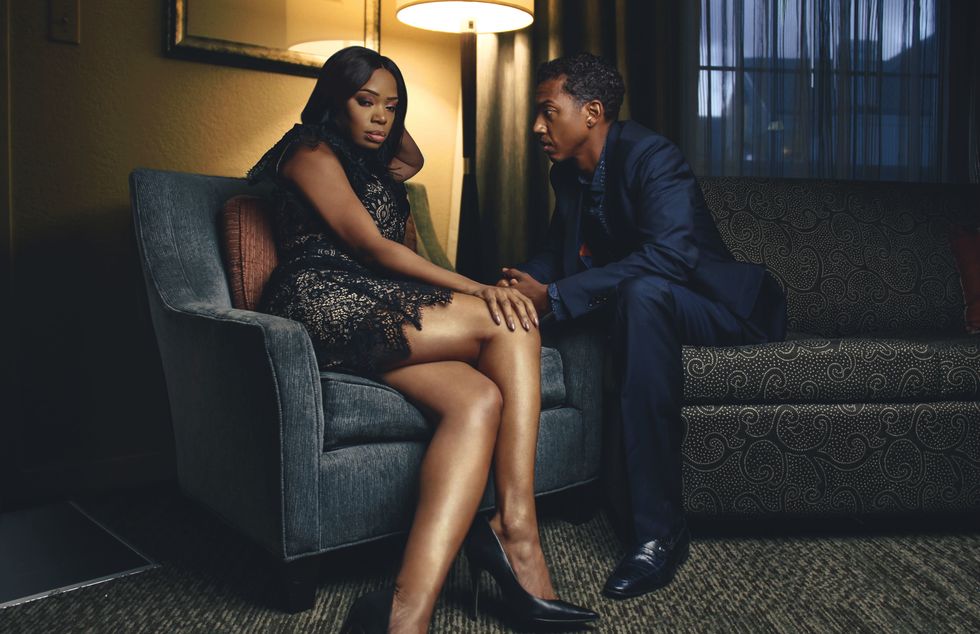Exclusive: Jill Marie Jones And Wesley Jonathan Talk New Series, Celibacy, And Swinger Couples

Monogamy isn't especially popular today as swipe-right culture and oversharing has increased, thanks to social media.
Through the vast majority of content society markets to us daily, falling in love and being committed to one person is an idea most of us can easily subscribe to but, to be honest, doesn't seem all that attainable. Tabloids and Top 40 hits constantly boast allegations of cheating scandals, and on almost every reality shows and scripted series, there are extramarital temptations being discussed, and unfortunately, celebrated.
So, is monogamy possible? Of course. But, according to The Urban Movie Channel's new series Craig Ross Jr.'s Monogamy, it damn sure isn't easy.
Husband and wife producing team Craig Ross Jr. and Caryn Ward Ross have created this new drama series to challenge how we view the practice. Each episode follows four married couples who resort to a spouse-swapping experiment as a last ditch effort to save their relationships. Starring Caryn Ward Ross, Jill Marie Jones, Vanessa Simmons, Chrystee Pharris, Blue Kimble, Brian White, Wesley Jonathan, and Darius McCrary, the show may bend your previous perspective on marriage, what you'll do to maintain love and discuss your views on commitment honestly. "I love [this show] because it's something that I'd never seen before in television and film," says Jones.
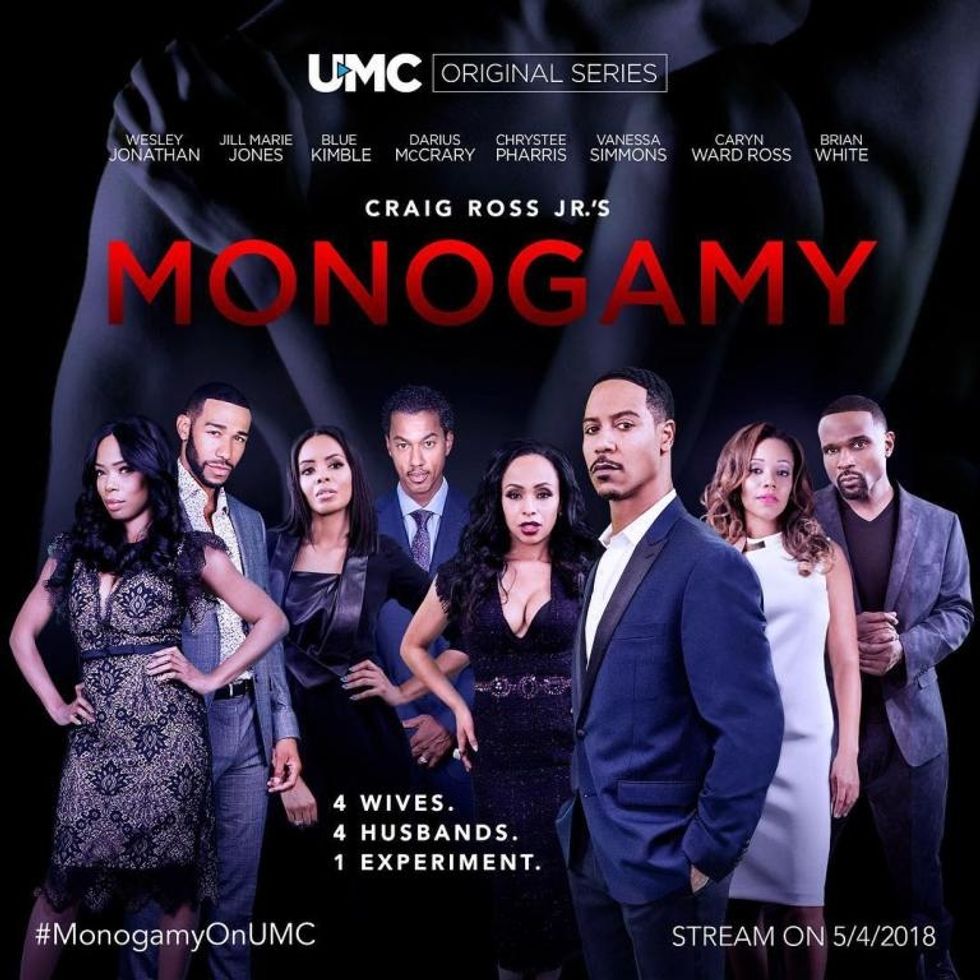
Jones plays Maggie, an emotionally guarded, type-A woman, who is married to Wesley's Carson, a Christian man who's kind but is hard pressed to loosen up. The couple experienced a horrible tragedy but struggle to share more than hollow pleasantries day to day. By the first episode's end, Maggie is paired with Sawyer (Kimble) and Carson is with Simmons' Caroline.
xoNecole got Jones and Jonathan on three-way to chat about their personal feelings on monogamy, how healthy relationships can best be achieved in a social media climate, and what they hope audiences learn about black love from the series.
As I watched the first three episodes, there are a lot of personal obstacles it seems every character is facing. The overarching theme is everyone's relationship is in need of dire help, but it's apparent that each person is having some individual struggle. Which character do you feel has the hardest personal obstacles to face?
Jill Marie Jones: I think everybody. The d-word is looming, and every character is at their wit's end because they're looking at the cliff and saying, "Am I jumping or am I not jumping?" For every single character, the stakes are very high.
If you found yourself in the same dire marital situation, would you try an experiment like this?
Wesley Jonathan: Absolutely not. You're playing with fire. You're tapping into the possibility of actually liking the experiment to the degree to where you end up crossing those lines with the person. I don't think that is the answer. It's a desperation move. To me, it's a major no-no, especially if the person is attractive. You [are] asking for problems.
Right, and out the gate in the show you can see the chemistry between the newly swapped coupled. So, what is your advice for couples having relationship struggles IRL?
WJ: Oh, that's easy. You have the one source of practical teaching and you don't have to be religious to look into it, and that's the Bible. It's practical teaching for marriage, for love, and for happiness period. You don't have to be religious, but if you have practical morals—you don't steal, you don't lie, you don't kill—you can look into the Bible, the source. There, is practical teaching on how to have a happy marriage. Everything else is secondary.
"You can look into the Bible, the source. There, is practical teaching on how to have a happy marriage. Everything else is secondary."
JMJ: First thing I would say is communication. Sometimes I feel like in relationships, even in my friendships, we don't communicate if something hurt us or if something didn't make us feel good.
I like that you mentioned your friendships because all of it is relationships with other people really.
JMJ: Yeah, for sure. After my last boyfriend, I took a sabbatical. It's amazing how much you hear when sex is not on the plate.
I agree. Sex can bring so much noise to where you don't communicate how you really feel.
JMJ: Right! Because if it's good, it's like, 'Girl, he's OK. He didn't really mean what he said. I didn't see what I saw.' It clouds your judgement. Your body is a temple; own it. Own you. It shouldn't be easily given to anyone.
That segues perfectly because with today's generation of dating individuals, there's so many distractions like dating apps, social media, and this general environment of oversharing and #relationshipgoals. So what's your advice for the younger, 20 somethings coming up. Some want traditional marriage but then there are the kids who just want to date and have fun. What do you say to them?
JMJ: I would say to just live your life in your 20s. Work toward your business acumen but in your relationship life, you should live. When you meet the one you're supposed to be with, when you're both mature enough to live life, then you're ready.
WJ: That's tough, real tough. If I could go back, I would definitely focus more energy into me, myself, and my career and getting myself together. But it's only natural for a young man and woman to like each other. So for me to say not to explore, that would be unrealistic. I would say though find some self-control, however you see fit.
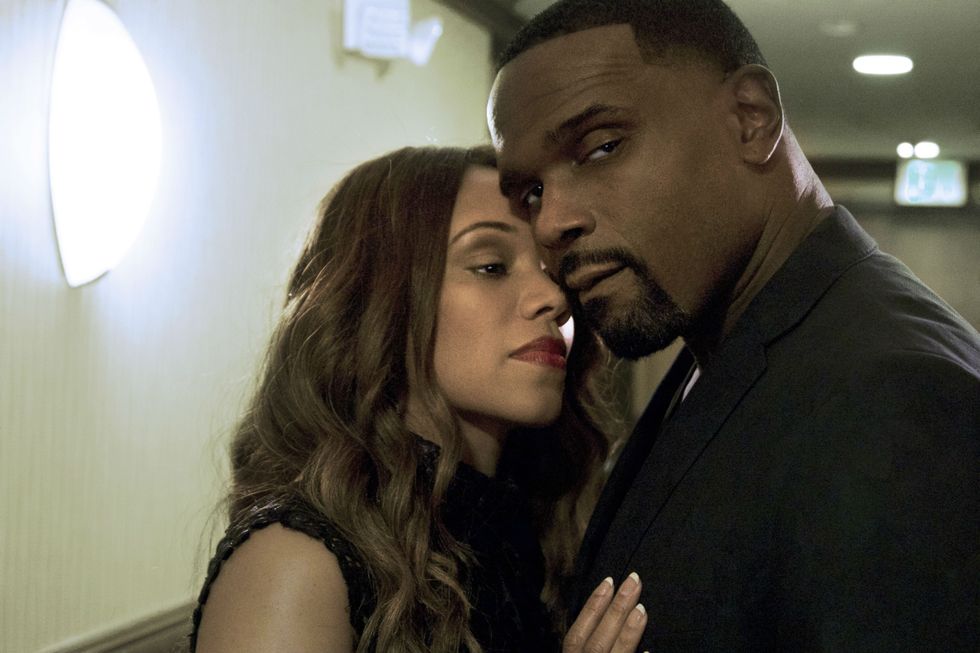
JMJ: So you're agreeing with me!
WJ: Oh, well I definitely agree to a degree. When you say "live," to me you have to be more specific.
JMJ: I'm just saying in your 20's, don't try to make hard plans in your personal life but work on your business.
WJ: Yeah, what happens is that everything is so fast and so quick now, and because there's no self-control, there's no discipline. People are just jumping to do stuff and they find themselves all jacked up. Take a minute, take a step back, and truly evaluate the situation. Don't be so quick to throw your genitals up on that screen. Just find self-control.
You make a great point about self-control. Not a lot of people harp on the discipline aspect of relationships or growing up, which can curb things like cheating. Wesley, as a married man, do you feel monogamy in a marriage is natural? Is it necessary for a lasting, fulfilling relationship? Because the series challenges those ideas.
WJ: I feel monogamy is possible. It is natural? Yeah. But it's also natural to look at someone and say they're attractive. Here we go with self-control again. Some people would say it's not natural to be with one person because they're looking at everything else. Well, that's just because you have no self-control. Our imperfect impulses have us looking at others, and that's being greedy and not having any self-control and losing the value in what you have. Sometimes you have to come back to the person that you're with, work things out and rejuvenate, and have a conversation, even if it hurts. Those conversations help. But to say it's not natural to be monogamous is an excuse for everybody to be with everybody. It is natural to be with one person. That's God's arrangement. If you add more people to the marital bed, it gets real cloudy.
"Our imperfect impulses have us looking at others, and that's being greedy and not having any self-control and losing the value in what you have."
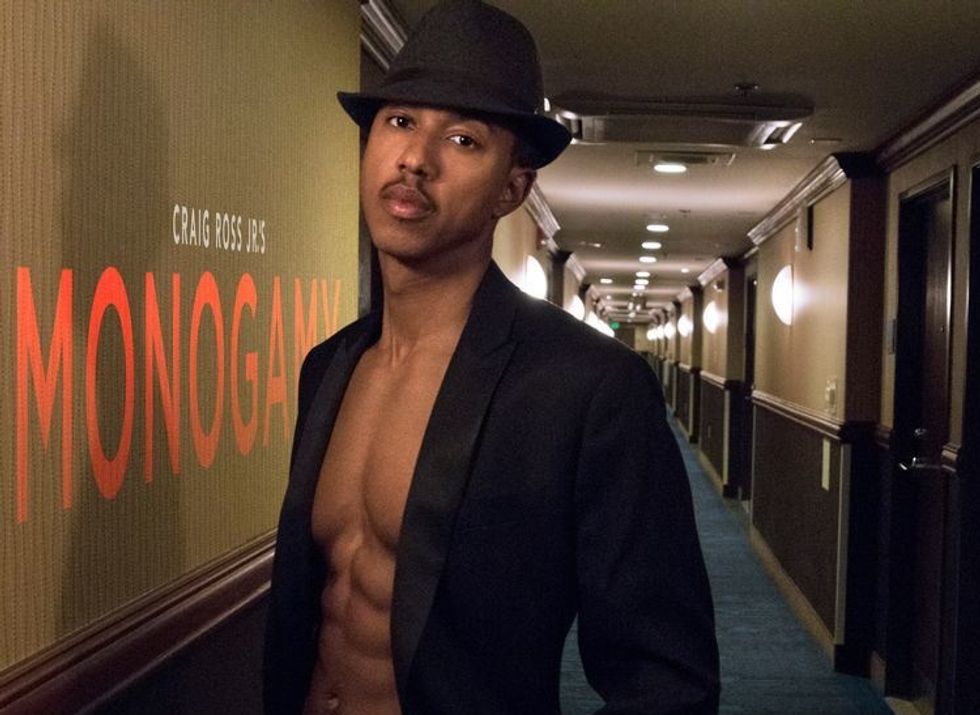
Jill, I want to ask you the same question but tailor it a bit differently. Black women, as you know, are always as far as headlines go, dealing with being cheated on and many women go into relationships with a fear or expectation of being cheated on. In relationships outside of marriage, do you feel monogamy is natural thing or something to be expected nowadays?
JMJ: Well, OK, yes I believe in monogamy. But I have two different couples that are together and they swing. And I have to say, both of those couples have great relationships. One couple's been together 18 years, the other maybe 11 or something like that. So I think in 2018, people carve out what monogamy means for them. It wouldn't work for me but it works for these two couples. So I understand, it's complicated.
"I think in 2018, people carve out what monogamy means for them."
WJ: But check this out though, is that still, in fact, monogamy? People start to take the true meaning of words and flip them. If y'all swinging, that's technically not monogamy. Y'all just understand it to be OK with each other. It doesn't make you unhappy.
So maybe it's not monogamy, but what Jill is saying is every couple should do whatever helps their relationship last, whether it's monogamy or not, right?
JMJ: Exactly. If it works for them, they're the only people that are in that, right? So if it works for them, that's cool.
WJ: Nah, that's polyamory [Laughs]. You missed the key phrase, it's the state or practice of being with one. It changes the game when you add another person. You can do that if you like, and you can say, 'Aye, it's just us three,' but they're not practicing monogamy because it's more than one person.
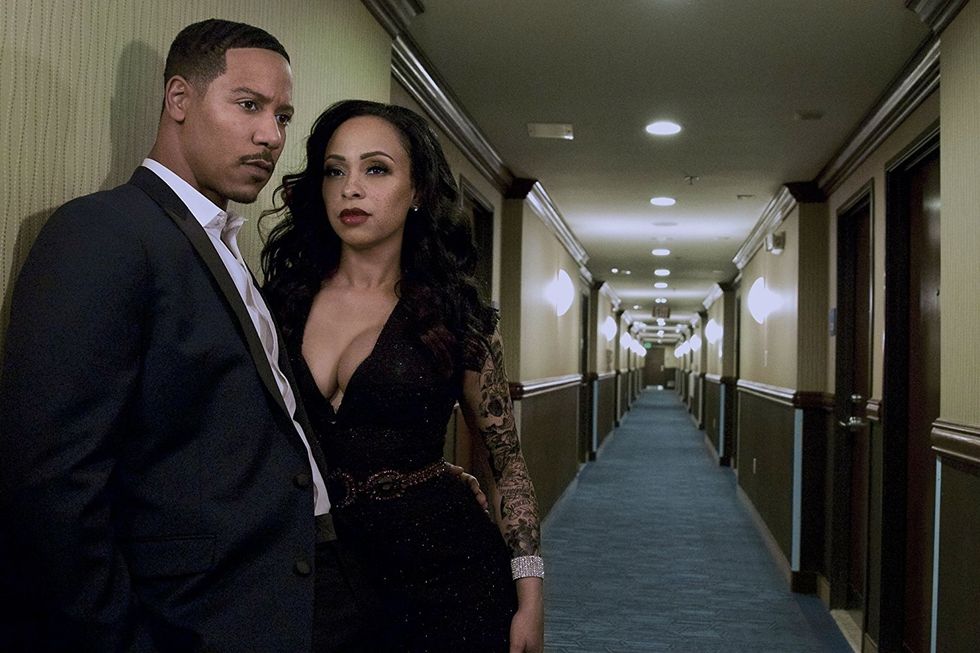
What do you hope the audience learns from this unique way of discussing Black love?
JMJ: It's a show that after each episode will provoke conversation. That to me is the brilliance of it all. People need to not just tell their loved ones the good-good stuff. Your partner needs to hear about what's not working. The things like, 'Wow, I wish you could be better at this.' Communication, I would hope, comes out of the show.
WJ: Yeah, she kinda took it. She's right. It brings up great conversation and controversy. As far as taking anything away, I just want people to feel. Whether it makes you angry, appalled, makes you cry, I just want you to feel something.
Lastly, your hope for [your characters] Maggie and Carson?
WJ: Man, I hope that we work it out!
Be sure to check out 'Craig Ross Jr.'s Monogamy' on UMC TV, available now to stream the entire series. And for more Jill-Marie Jones and Wesley Jonathan, follow them on Instagram.
This Is How To Keep 'Holiday Season Stress' From Infecting Your Relationship
Hmph. Maybe it’s just me, but it seems like there is something really weird happening in the fall season air (because winter doesn’t officially begin until December 21) that cuddle season is in full swing while break-up season is as well. In fact, did you know that break-ups are so popular during the holiday season that December 11 is deemed Break-Up Day?
The reasons why relationships shift around this time vary; however, I did both roll my eyes and chuckle when I read that a very popular one is because it’s an easy way to get out of getting one’s significant other a Christmas present. SMDH.
Anyway, I personally think that the less shallow folks out here may contemplate calling things “quits” or they at least distance themselves a bit from their partner (and what I’m referring to is serious relationships) due to all of the stress and strain that oftentimes comes with the holidays whether it be financial, familial, due to their tight schedules or something else.
Listen, I would hate for you and your man to miss the fun and happiness of experiencing this time of year, all because you are so overwhelmed or irritated that you can’t really enjoy it. That’s why I have a few practical tips for how to avoid allowing the typical holiday season stress from INFECTING your relationship.
Manage Your Expectations
 Giphy
GiphyUnmanaged expectations. If there is a main reason why the holiday season tends to be so stress-filled for so many people, I’d bet good money that this is the cause. And when you’re in a long-term relationship, expectations can manifest themselves in all sorts of cryptic and/or unexpected ways. You might have relatives who assume that you are going to be with them for Thanksgiving or Christmas when you have other plans in mind. You might be thinking that you are going to spend one amount for presents while your man is thinking something totally different. When it comes to scheduling, your signals may be crossed.
And you know what? To all of these scenarios, this is where clear and consistent communication come in. Don’t assume anything. Don’t dictate anything either. From now until New Year’s, mutually decide to check in once a week, just to make sure that you are both on the same page as it relates to the holidays and what you both are thinking will come along with it. The less blindsided you both feel, the less stressed out you will be. Trust me on this.
Set (and Keep) a Budget
 Giphy
GiphyOkay, so I read that last year, 36 percent of Americans incurred some type of holiday-related debt. Hmph. Last year, there was still some sense of normalcy in this country, chile, so I can only imagine what finances are gonna look like over the next several weeks. That said, since I don’t know a lot of people who don’t find being broke stressful, make sure that you and your bae set a budget and then stick to it this year — no ifs, ands or buts.
Because really, y’all — it doesn’t make sense to deplete savings and/or max out credit cards for a few days of giggles only to be damn near losing your mind because you don’t know how to make ends meet come Dr. Martin Luther King, Jr. Day.
And by the way, this tip doesn’t just speak to things like food and gifts; I also mean travel. If it doesn’t make a ton of sense (or cents) to be all over the place this year — DON’T BE.
Keep Matthew 5:37 at the Forefront
 Giphy
GiphyIf off the top of your head, you don’t know what Matthew 5:37 says, no worries, here ya go: “But let your ‘Yes’ be ‘Yes,’ and your ‘No,’ ‘No.’ For whatever is more than these is from the evil one.” That verse right there? Oh, it’s a boundaries lifesaver! I say that because do you see “maybe” or “I’ll think about it” in there? Nope. LOL. It says that you should tell people “yes” or “no” and leave it at that — and that complements Anne Lamott’s quote, “’No’ is a complete sentence” impeccably well. Yeah, you’ve got to remember that anything beyond a yes or no to a request is privileged information; you don’t owe anyone details or an explanation.
Besides, if you are really honest with yourself, when someone asks you something and you give a “Umm, let me think about it” kind of reply, more times than not, you already know what your answer is going to be — so why not let you both off of the hook? Give your response. Commit to that. And let everyone (including yourself) get on with their lives and schedules.
I promise you that when it comes to those holiday parties, you are pissing more folks off by not RSVP’ing or doing so and not showing up than just saying, “Thank you but not this year” off the rip.
Remember That Your Personal Space Is Privilege Not a Right
 Giphy
GiphyA friend of mine recently bought a new house and invited me over to come see it. He’s a single man with no children, so as I was taking in all of the space that he had, especially as I walked through his finished basement, I joked about relatives coming to live with him. “Hell no” and “absolutely not” were pretty much his immediate responses as he went on to say that some folks even had the nerve to be offended when he told them that he had no intentions on taking DNA in.
Ain’t it wild how people think that your stuff is their right? And yes, that brings me to my next point. Your home is your sanctuary space. If you want to host folks this year — cool. If not, ALSO COOL. Please don’t let folks (family included) guilt you into how they want you to act or even into what they would do if the shoe was on the other foot. You are not them — and as one of my favorite quotes states, “If two people were exactly alike, one of them would be unnecessary.” (A man by the name Larry Dixon said that.)
Hell, my friends? They know that I am good for sending them random things that they need or even want all throughout the year. Coming over to hang out at my pace, though. Uh-uh. Chalk it up to being a card-carrying member of the ambivert club yet I like keeping my living space personal — and I sleep like a baby, each and every night, for feeling that way.
Always remember that your space, your time, your resources, your energy and shoot, yourself period (including your relationship), are all things that are your own. You get to choose how, when and why you want to share them. The holiday season is certainly no exception.
Cultivate Some “You Two Only” Traditions
 Giphy
GiphyIt’s not uncommon for some couples to hit me up after the holiday season to “detox.” Sometimes it’s due to the financial drama (and sometimes trauma) that they experienced. Sometimes it’s because they allowed their relatives (especially in-laws) to get more into their personal business than they should’ve. More than anything, though, it tends to be because they didn’t get enough quality time together and so ended up feeling “disconnected.”
Please don’t let that happen. Listen, I’m not even a holidays kind of woman and yet, I will absolutely sit myself down with some hot chocolate and chocolate chip cookies to enjoy a Hallmark holiday film or two. Aside from the fact that most of them are lighthearted and sweet, I also like that they usually focus on couples loving on each other amidst all of the holiday beauty and ambiance — which is something that all couples should set aside some time to do.
Maybe it’s a vacation. Maybe it’s a staycation. Or maybe it’s my personal favorite, A SEXCATION. Whether it’s for a few days, the weekend or even overnight — don’t you let the holidays go by without setting aside time for you and your man to celebrate one another. Don’t you dare (check out “Are You Ready To Have Some Very Merry 'Christmas Sex'?”).
GET. SOME. REST.
 Giphy
GiphyI once read that 8 out of 10 people get stressed out over the holidays and 3 out of 10 lose sleep during to it — and when you’re stress-filled and sleep-deprived, that can absolutely lead to hypersensitivity, making mountains out of molehills and even not being in the mood for sex.
Your relationship can’t afford to go through any of this, so definitely make sure to prioritize rest. I don’t care how unrealistic it might seem during this time, sleep should never be seen as a luxury; it will always and forever be a great necessity.
That said, try to get no less than six hours of shut-eye in (check out “6 Fascinating Ways Sex And Sleep Definitely Go Hand In Hand”) and even ask your bae to take a nap with you sometimes (check out “Wanna Have Some Next-Level Sex? Take A Nap, Sis.”). Not only will sleep help to restore your mind, body and spirit but, when it’s with your partner, it’s an act of intimacy that can make you both feel super connected, even in the midst of what might feel like chaos.
___
Holiday season stress is real. Still, never give it the permission or power to throw your relationship off. Put you and your man first and let the holidays be what they are gonna be, chile.
Let’s make things inbox official! Sign up for the xoNecole newsletter for love, wellness, career, and exclusive content delivered straight to your inbox.
Featured image by Shutterstock
Dreaming Of A White Christmas? These 7 Winter Wonderland Destinations Are Perfect For The Holidays
While most people opt for a tropical vacation during the winter months, there are still many people who want to fulfill their winter wonderland fantasies, which are more than likely centered on watching snow by the fireplace while sipping some hot cocoa.
With Thanksgiving vastly approaching and Christmas a little under a month away, there is still time to ditch the traditional Christmas home to visit family or friends.
Whether you’re looking to put a new stamp on your passport and keep things domestic with a destination in the States, xoNecole has you covered with a few hotspots for those itching to go somewhere cold (but with cozy vibes) this holiday season.
Aspen, Colorado
Our Christmas queen, Mariah Carey, has been taking an annual trip to this snowy destination since 1997, just three years after dropping the track that would make her the unofficial (but official to us) ambassador of the winter holiday.
Aside from being a key vacation spot for one of the culture’s greatest musicians, Aspen also offers travelers access to world-class skiing and snowboarding and four distinct mountains that provide the perfect backdrop for a winter vacation.
Whistler, British Columbia, Canada
Home to the largest ski resort in North America, Whistler Blackcomb, this destination is located in the Coast Mountain Range and is about 75 miles north of Vancouver.
From luxury spas like Scandinave Spa Whistler to Olympic Park, this is another top winter vacation spot that offers a unique experience for people who love snow and the thrill of a good adventure.
Western Massachusetts
Dubbed the place for a magical holiday escape, Springfield, Massachusetts, blends the warmth of small-town charm with unforgettable experiences like Grinchmas at Springfield Museums, Winterlights at Naumkeag in Stockbridge, Historic Deerfield’s Winter Frolic, and many others.
This destination offers something for all ages, and it’s close to home, making it all the more reason to place on your radar for a winter getaway.
Rovaniemi, Finland
If you want to really get into the Christmas spirit, this just may be the place for you. As the official home to Saint Nick himself, Rovaniemi, Finland offers reindeer sleigh rides, the opportunity to stay in a glass igloo, as well as an opportunity to experience the Santa Claus Village.
Lake Tahoe, California/Nevada
Who says that visits to the lake house are only reserved for summer vacation? A winter trip to Lake Tahoe is equipped with stunning lake views and top-notch ski resorts, including Heavenly and Northstar.
Chamonix, France
Sitting at the base of Mont Blanc, Chamonix, France, is known for its skiing and mountaineering. This destination is home to the Aiguille du Midi cable car, the charming Alpine village, and is also close to various other European ski destinations.
Northeastern Pennsylvania
This area of the U.S. state is home to the Poconos Mountains, whose renowned ski resorts include Camelback Mountain, Blue Mountain, and Jack Frost Big Boulder. Whether you’re a ski expert, a beginner, or just there for the vibes, this destination makes for a winter vacation that balances fun adventures and cozy getaways. Additionally, Pennsylvania is home to the Christmas Tree Capital of the world.
Feature image by Shutterstock
Originally published on November 23, 2024



